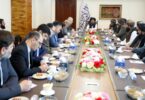James L. Jones, Jr.
In January 2003, I assumed command of the operational forces of NATO in Mons, Belgium—a day after assuming command of the United States European Command (EUCOM) in Stuttgart, Germany. One wouldn’t know it from the name, but at the time EUCOM’S area of responsibility included not just Europe but also forty-two African countries, with the continent’s eleven other nations split between Central Command and Pacific Command.
NATO was then in a period of great expansion, as it added former Warsaw Pact countries and became involved in military operations in Afghanistan and Iraq. It became clear to me that having EUCOM—an integral part of NATO—manage responsibilities across two continents was going to be difficult, if not impossible.
The United States, for its part, was focused on the new wars in Afghanistan and Iraq and the global war on terror. Developments in Africa did not always make their way into the President’s Daily Brief, even as the terrorism threat on the continent grew, fragile democracies struggled to survive, and China rapidly replaced the Unites States as the top trading partner for many African nations.
The calls by many African leaders for more American engagement, meanwhile, were increasing, especially among those alarmed by China’s expanding presence and influence in the region. In 2004, after much discussion, my deputy at EUCOM, General Charles F. Ward, and I became convinced that Africa needed its own unified US military command. We felt that demonstrating American capability and resolve to assist the democratic development of the world’s second-most populous continent was of critical importance.
We made our proposal to Washington and it eventually became a reality: The newly created United States Africa Command (AFRICOM), headquartered in Stuttgart alongside EUCOM, began its operations in 2007. It has been a key component of US strategy ever since—and promises to be more essential than ever as the United States recalibrates its international priorities. Africa’s total population will eclipse China’s in the relatively near future; its economic potential is without peer; and its natural resources are abundant and should be safeguarded from China’s ongoing plunder.
All of which explains why now is the time to make AFRICOM even better.
To do so, the first step would ideally be to move AFRICOM’s headquarters from its current base in Stuttgart to a country in Africa itself—if a willing host nation can be found—so that the United States can establish a more enduring presence on the continent.
Second, AFRICOM’s structure should be reconfigured to better reflect the breadth of America’s foreign-policy bureaucracy. AFRICOM can be the place where the State, Commerce, Energy, and Defense Departments come together to hone and implement US strategy for the continent. If AFRICOM were restructured in such a way, and if it were categorized as a “unified command” rather than a “combatant command,” potential African host nations might be more likely to step forward.
And finally, the US government should re-emphasize the importance of its unified military commands, especially the seven geographic ones.
They remain a tremendous gift from the previous century and we should never take them for granted. Occasionally, US political leaders advocate retrenchment from the country’s forward military presence, but it’s vital for the United States to maintain commands in regions where it has national interests and international responsibilities.
No other country has ever been afforded the privilege of such welcome within the borders of our friends and allies—and for such a prolonged period. We should continue to strengthen and adapt these commands to meet the challenges of our time.
General James L. Jones is the executive chairman emeritus of the Atlantic Council, former commandant of the US Marine Corps, former Supreme Allied Commander Europe, and former national security advisor to President Barack Obama.






